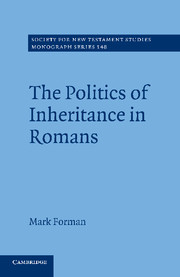Book contents
- Frontmatter
- Contents
- Preface
- List of abbreviations
- 1 Introduction: the politics of inheritance?
- 2 Some features of Greco-Roman society in the symbols, ritual and literature of Paul's time
- 3 Promising the world: inheritance in Romans 4:13–25
- 4 Suffering “conquerors”: inheritance in Romans 8:17–39
- 5 “Riches for the world”: inheritance in Romans 11:1
- 6 “Lords” over all the world: the language of inheritance in Galatians
- 7 Inheritance in 1 Corinthians and Colossians
- 8 Conclusions
- Bibliography
- Index
- References
5 - “Riches for the world”: inheritance in Romans 11:1
Published online by Cambridge University Press: 03 May 2011
- Frontmatter
- Contents
- Preface
- List of abbreviations
- 1 Introduction: the politics of inheritance?
- 2 Some features of Greco-Roman society in the symbols, ritual and literature of Paul's time
- 3 Promising the world: inheritance in Romans 4:13–25
- 4 Suffering “conquerors”: inheritance in Romans 8:17–39
- 5 “Riches for the world”: inheritance in Romans 11:1
- 6 “Lords” over all the world: the language of inheritance in Galatians
- 7 Inheritance in 1 Corinthians and Colossians
- 8 Conclusions
- Bibliography
- Index
- References
Summary
Introduction
In the discussion of the concept of inheritance in Romans 4 and 8 above, several themes have emerged. First, the term refers to a geographical reality which includes the renewal of the earth. While inheritance is often read in individualized and spiritualized terms, an exploration of the concept in Romans 4 and 8 suggests that instead it should be understood as a restoration of the entire cosmos. Closely related to this dimension of the concept is the claim to universal sovereignty which is suggested for those who are considered “heirs of God.” On the one hand, this aspect of Paul's eschatology is likely to have been viewed as a bold counter-claim to the worldview being presented by the Roman Empire of Paul's day. On the other hand, as was hinted at in Romans 4 and made more explicit in Rom. 8:17, the language of inheritance seems to have simultaneously been a subversion of all other paths to lordship. Those who are “heirs of Christ,” Paul insists, will rule not in the manner of imperial power but in line with the example of the crucified messiah whom they follow.
In all English translations of Romans and in the most recent editions of the Greek New Testament, Rom. 8:17 is the last explicit reference to heirs or inheritance. But this is not the case in all manuscripts of the Greek New Testament.
- Type
- Chapter
- Information
- The Politics of Inheritance in Romans , pp. 136 - 171Publisher: Cambridge University PressPrint publication year: 2011

